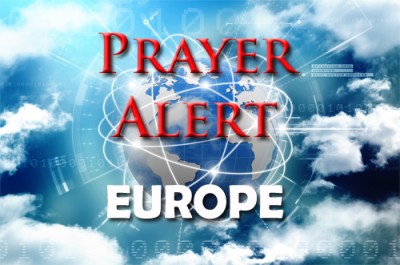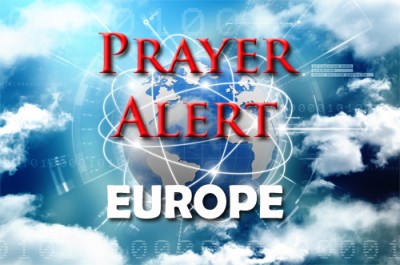Ukraine: Russia captures strategic town
04 Oct 2024Russia has captured the strategic eastern Ukrainian town of Vuhledar, a significant blow to Ukraine as it faces its third wartime winter. Russian soldiers have raised their flag over the devastated town, once home to 14,000 people but now reduced to just over a hundred. Ukraine’s military confirmed their withdrawal, citing the threat of encirclement as Russian reinforcements arrived: their manpower advantage had finally broken Ukraine’s fierce resistance.The town sits at a crucial junction of Ukraine’s eastern and southern fronts: Ukraine now has to fight to stop the Russians advancing further west, making the prospect of retaking territory even more remote. This comes just after Volodymyr Zelensky's return from the USA, where he secured aid but not the security guarantees he sought. With Ukraine’s energy infrastructure still under attack, the coming winter will test its resilience even further.
Four Russian journalists have gone on trial in Moscow, accused of involvement in an ‘extremist’ group linked to FBK, an organisation set up by the late dissident Alexei Navalny. The defendants face up to six years in prison if convicted. The trial, which closed to the public after a brief open session, underscores the worsening climate for press freedom in Russia. The prosecutors allege that the journalist contributed to content for the YouTube channel run by FBK, which has been labelled an extremist organisation. As Russia tightens its grip on the media, 34 journalists and six other media workers are currently in detention, according to Reporters without Borders. Russia has intensified pressure on both domestic and foreign reporters since the start of its war in Ukraine.
An Israeli airstrike on central Beirut, targeting a building connected to Hezbollah’s health unit, has killed at least six people and wounded seven more. On 28 September another airstrike on the city resulted in the death of Hezbollah's leader, Hassan Nasrallah, and Israel has now launched a ‘limited’ ground offensive in southern Lebanon against Hezbollah. The two forces are currently engaged in fierce combat, with casualties on both sides. Caretaker prime minister Najib Mikati has said that about 1.2 million Lebanese have been displaced by Israeli attacks. Meanwhile, on 1 October Iran launched 180 missiles against Jerusalem, with remarkably few casualties, and Yemen’s Houthis and armed groups in Iraq have launched attacks in the region in support of Hamas in its war with Israel in Gaza.
The Amazon is experiencing a huge environmental crisis; fires have ravaged over 62,000 square kilometres of forest, exacerbated by Brazil’s most severe drought. The fires, usually deliberately started by loggers, miners, and farmers seeking land, are decimating the region. Raimundinha, who leads an indigenous firefighting brigade, has warned: ‘If these fires continue, we indigenous people will die’. Respiratory issues are already affecting her family, and the fires are increasingly encroaching on lands which in theory are protected by the government. The drought has not only fuelled these fires but also drained rivers, making daily life for some nearly impossible. With dwindling resources and rising temperatures, the situation in the Amazon highlights the fragile balance between human activity and environmental conservation, as well as the catastrophic effects of climate change.
On 1 October, in a televised speech to mark Nigeria’s 64 years of independence, President Bola Tinubu acknowledged the financial struggles and search for meaningful employment faced by many people. He listed security gains and investments in farm machinery among achievements which would help ease economic pressures, and also announced a national youth conference, known as ‘the 30-day Confab’, whose recommendations would be considered and implemented. The president stressed that the government is mindful of future generations and their potential to contribute to the nation’s progress. However, protests against the current economic hardships have taken place in several states, reflecting discontent among citizens. Some expressed disappointment with the lack of concrete measures to reduce inflation and improve living standards. Tinubu defended his economic reforms, which have pushed the inflation rate to a 28-year high.
According to the IPC, a world hunger watchdog, nearly 48% of Haiti's population faces acute food shortages. Over five million people are enduring ‘high levels of acute food insecurity’ from August 2024 to February 2025. Armed gang violence, rampant across Haiti, is a major factor contributing to the crisis. Despite international interventions and the appointment of a new government, the gangs currently control 80% of Port-au-Prince and key roads leading to the north and south of the country. The difficulties have led to high Inflation, with food costs now consuming up to 70% of household expenses. The lingering impacts of natural disasters like Hurricane Matthew and the 2021 earthquake further exacerbate the situation. A UN-backed mission led by Kenya has made some progress, but the IPC has warned that the overall crisis will likely worsen in the next eight months.
A devastating monsoon downpour in Nepal has led to severe flooding and mudslides, claiming over 200 lives, injuring 127, and leaving 56 missing. Rescue operations successfully saved over four thousand stranded people. However, despite warnings of more heavy rains, the prime minister admitted that he had not anticipated such flooding in Kathmandu. One critic has said that the government ‘miserably failed to not only protect people’s lives but also, according to its admission, to coordinate the resources and manpower to save them’. Even the mayor of Kathmandu struggled to mobilise resources effectively. Critics have called for a more robust disaster management strategy by revitalising the national disaster management authority, allocating resources, and involving experts. Disaster prevention and management must be a top priority, transcending political lines, to protect the nation from future crises.
Hans Schmidt, a street preacher and military veteran, was shot in the head while sharing the Gospel in Arizona. Unaware of the gunshot, he drove to his church, Victory Chapel, with blood streaming down his face. On the way to the hospital, he suffered a seizure and became unconscious. Doctors gave little hope, telling his wife Zulya that the outcome looked grim. They expected death, and detectives even spoke of an autopsy. However, prayer warriors across the nation began interceding for him. Hans was placed in a medically-induced coma and remained unresponsive for a month. Then, miraculously, he woke up and spoke. His wife was astonished and overjoyed. Against all odds, he fully recovered, returned to his family, and resumed playing the drums at church. He has also forgiven his assailant, who was never found. Now, he continues preaching the message of God’s love, focusing on the importance of forgiveness.







